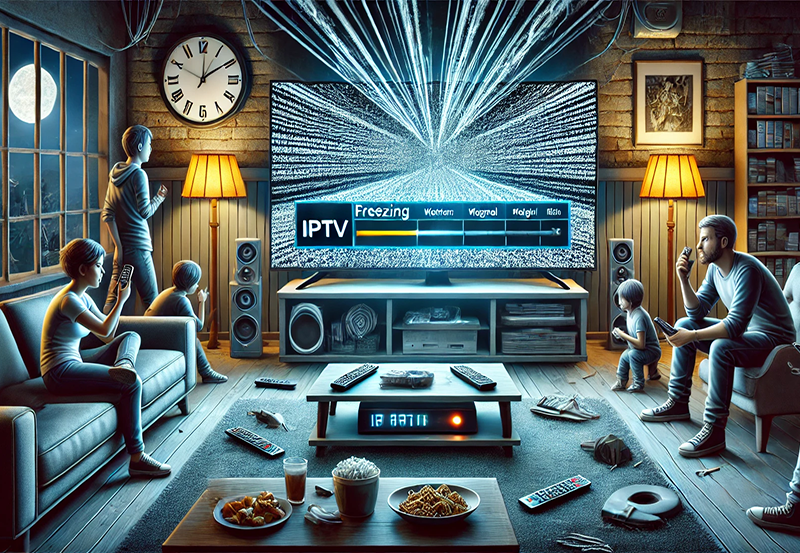In the age of digital transformation, Internet Protocol Television (IPTV) has emerged as a prominent alternative to traditional cable and satellite TV services. Combining the flexibility of internet-based streaming with the extensive channel offerings of conventional TV, IPTV provides a versatile viewing experience tailored to modern audiences. A key component in optimizing this experience is ensuring seamless compatibility and setup with Smart TVs. This article explores the intricate relationship between IPTV and Smart TVs, offering a comprehensive guide to achieving optimal performance and user satisfaction.
Buy 1 Year IPTV and Enjoy Unlimited Content
Understanding IPTV and Smart TVs
IPTV refers to the delivery of television content over internet networks, allowing users to stream live broadcasts, on-demand videos, and interactive media. Unlike traditional broadcasting methods, IPTV leverages the power of internet connectivity to offer a more personalized and flexible viewing experience.
Smart TVs, on the other hand, are television sets equipped with integrated internet capabilities, enabling users to access online content, applications, and streaming services directly from their TV interface. The synergy between IPTV and Smart TVs lies in the ability to harness these internet capabilities to deliver a superior entertainment experience.
Compatibility Factors
Ensuring compatibility between IPTV services and Smart TVs involves several key considerations:
- Operating System and Firmware: Smart TVs operate on various platforms such as Android TV, webOS, Tizen, and Roku TV. Ensuring that your IPTV service supports these operating systems is crucial for seamless integration.
- App Availability: Many IPTV providers offer dedicated applications for Smart TVs. Verifying the availability and compatibility of these apps with your TV’s operating system ensures ease of access and optimal performance.
- Network Requirements: A stable and high-speed internet connection is essential for IPTV streaming. Smart TVs should be connected via Ethernet or high-speed Wi-Fi to support uninterrupted streaming.
- Hardware Specifications: The processing power and memory of your Smart TV can impact the performance of IPTV applications. Ensuring that your TV meets the recommended specifications for your chosen IPTV service is important for smooth operation.
Setting Up IPTV on a Smart TV
Setting up IPTV on a Smart TV can be a straightforward process if approached methodically. Follow these steps to ensure a successful setup:
1. Choose a Reliable IPTV Service
Select an IPTV provider that is reputable and offers a wide range of channels and on-demand content. Consider factors such as service reliability, customer support, and compatibility with your Smart TV’s operating system.
Stop the Buffering: Proven Solutions to Fix IPTV Lag Instantly
2. Install the IPTV Application
Most IPTV services provide dedicated applications for Smart TVs. Here’s how to install them:
- Android TV: Navigate to the Google Play Store, search for your IPTV provider’s app, and install it directly on your TV.
- webOS (LG TVs): Access the LG Content Store, search for the IPTV app, and install it.
- Tizen (Samsung TVs): Use the Samsung App Store to find and install the IPTV application.
- Roku TV: Add the IPTV channel through the Roku Channel Store by searching for your provider’s app.
3. Configure the Application
Once installed, launch the IPTV app and enter your subscription credentials. This typically involves inputting a username and password provided by your IPTV service. Some services may require additional configuration, such as entering a server URL or setting up an EPG (Electronic Program Guide).
4. Optimize Network Settings
For optimal streaming performance, ensure your Smart TV is connected to a high-speed internet connection. If possible, use a wired Ethernet connection to minimize latency and reduce the risk of buffering. Adjust your router settings to prioritize IPTV traffic, ensuring that streaming data is delivered efficiently.
5. Customize Viewing Preferences
Most IPTV applications allow users to customize their viewing experience. Adjust settings such as video quality, subtitle preferences, and parental controls to suit your personal preferences and viewing environment.
Troubleshooting Common Issues
Even with careful setup, users may encounter issues when using IPTV on Smart TVs. Here are common problems and their solutions:
- Buffering and Lag: Ensure a stable internet connection and consider reducing the streaming quality if your bandwidth is limited. Restarting your router and Smart TV can also help.
- App Crashes: Update the IPTV application and your Smart TV’s firmware to the latest versions. Reinstalling the app may also resolve persistent issues.
- Audio/Video Sync Problems: Check the audio settings on your Smart TV and IPTV app. Ensure that both are configured correctly and are compatible with each other.
- Login Errors: Verify your subscription status and re-enter your credentials. Clearing the app’s cache or reinstalling the app can also resolve authentication issues.
Enhancing Your IPTV Experience
To fully leverage the capabilities of IPTV on your Smart TV, consider the following enhancements:
- Use a VPN: A Virtual Private Network can improve privacy, bypass geo-restrictions, and prevent ISP throttling, ensuring a more reliable streaming experience.
- Upgrade Your Network Hardware: Investing in a high-performance router or mesh network system can enhance your internet speed and coverage, reducing the likelihood of buffering.
- Explore Additional Apps: Smart TVs offer a plethora of applications that can complement your IPTV service, such as media players, browser apps, and social media platforms, enriching your overall entertainment ecosystem.From Setup to Streaming: IPTV Essentials for Android Box Users
Conclusion
The integration of IPTV with Smart TVs represents a significant advancement in home entertainment, offering unparalleled flexibility and a vast array of content options. By ensuring compatibility and following a systematic setup process, users can enjoy a seamless and enhanced streaming experience. As technology continues to evolve, the synergy between IPTV and Smart TVs is poised to deliver even more innovative and personalized viewing experiences, catering to the diverse preferences of modern audiences.





